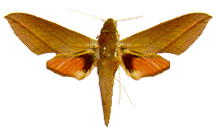|
Theretra alecto Linnaeus
Sphinx alecto Linnaeus, 1758, Syst. Nat. ed. 10: 492.
Theretra alecto Linnaeus; Rothschild & Jordan, 1903: 776.
|

Theretra alecto ♂
(.83
natural size)
|
Diagnosis. This and Theretra suffusa
Walker , suffusa, both have deep pink
hindwings, but in alecto the forewings are browner, less variegated, the
body lacks a pate dorsal stripe, there are lateral black patches at the
base of the abdomen, and the hindwing has the base and dorsum strongly
blackened, though there is a diagnostic pale zone at the tornus.
Geographical range. S.W. Asia, Japan, Oriental tropics to Sulawesi and
Kei.
Habitat preference. The species is infrequent in the lowlands, tending to
be taken cultivated areas.
Biology. The larva was described by Bell & Scott (1937) and Dupont
& Roepke (1941). The mature larva is green or reddish brown. The larva
is darker above the dorsolateral line, obliquely striped below it near the
abdomen of the brown form, There is a complete row of strong ocellar marks
over the abdominal segments, that on A1 only slightly larger. They are
black, ringed with white or dirty white, that on A1 with the pupil
ventrally green or purplish brown with the pale ring slightly broader.
Recorded host-plants (Bell & Scott, 1937; Dupont & Roepke, 1941;
CIE records) are: Saurauia (Actinidiaceae); Dillenia, Tetracera
(Dilleniaceae);
Leea (Leeaceae); Psychotria, Rubia (Rubiaceae); Cissus, Vitis
(Vitidaceae).
<<Back
>>Forward <<Return
to Contents page
|

